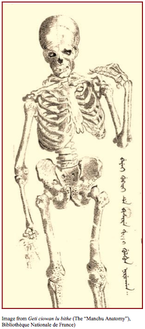Lecture Tomorrow! Tradutorre, Oktosi: Qing Bodies After ‘Chinese Medicine’, Dr. Carla Nappi1/23/2013  I'm quite disappointed that work will prevent me from attending Dr. Carla Nappi's lecture tomorrow afternoon (see PDF for details), especially as it might have been my only chance at finding out what the word 'Oktosi' means. :) Dr. Nappi is a prolific scholar whose interviews with current authors in the field of East Asian Studies have introduced me to a number of valuable books exploring various aspects of East Asian medicine and history. According to the flyer, this lecture will be about: Situating the history of medicine within a broader context of empire in Chinese early modernity transforms the way we understand science and medicine in relation to a historical notion of “China.” Paying special attention to the ways that translation shaped how bodies and their norms were understood in the Qing (1644-1912), this talk will consider the ways that a medical body emerged from Manchu, Tibetan, Mongolian, Chinese, and other language practices. I have to confess that there are too many unfamiliar concepts in this abstract for me to make any sense of it; starting with the idea of a 'medical body'. I've seen this usage before, but never had a firm idea of what exactly is being referred to. Thinking as I write, it seems that it is used to refer to what a certain culture accepts to be facts regarding the physical body, as informed by that culture's medical professionals. For example, the findings of anatomical studies have played an essential role in the development of modern biomedicine's 'medical body'. In ancient China the 'medical body' was informed primarily by texts such as the Nei Jing, large portions of which cover medical topics. Now what is confusing me is 'language practices'. The Manchu, Tibetan, Mongolian, and Han peoples were four of the major cultures that made up Qing dynasty China. Each culture had its own language, certainly, but what is being referred to by saying "a Manchu language practice", for example? How much influence could the practices (?) of a certain language have on the development of a 'medical body'? And by referring to 'empire' is Dr. Nappi saying that Qing dynasty China was an empire, rather than a nation? Is the reference to 'Chinese Medicine' in the title talking about the gathering together of disparate traditions into the single field called 'Chinese medicine' in response to the arrival of 'Western medicine' (and culture) in the late Qing? And what the heck does 'oktosi' mean??!! So many questions...if anybody who attends the lecture or who is familiar with these concepts can enlighten me here, please comment away! :)
2 Comments
Dan Bensky
1/23/2013 10:02:01 am
Henry - the Qing was an empire not a nation and predates the era of the nation-state in East Asia. The Manchus ruled over multiple nations of which the Chinese were just probably the most important. Lots of issues in present day China relate to this. A part of this short article describes this:
Reply
Henry
1/23/2013 11:59:06 am
Thanks Dan, that was a good read.
Reply
Your comment will be posted after it is approved.
Leave a Reply. |
AuthorPractitioner, Translator, Teacher Archives
March 2021
Categories |
 RSS Feed
RSS Feed